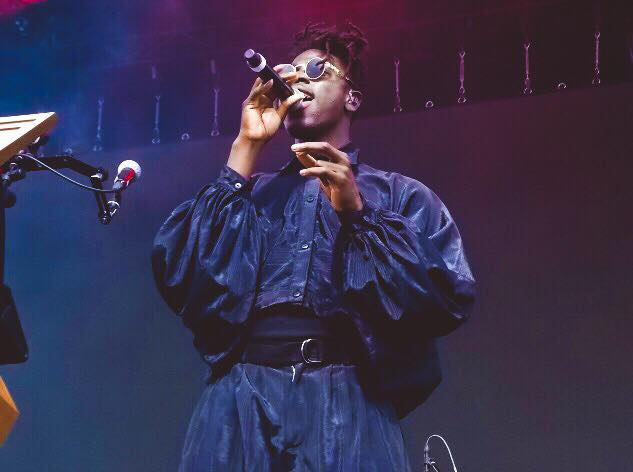Chicago music festival is pitchin’
Moses Sumney during his performance on Saturday, July 21.
August 30, 2018
When I was initially asked to go to Pitchfork and cover Sunday’s lineup for the Independent, I was excited because I had never had the chance to experience a music festival of that magnitude before.
Having seen the crowds at Lollapalooza, I told myself being around that amount of people would be a headache and that I wouldn’t enjoy the music as much. Pitchfork, however, seemed to be a more scaled down and intimate event. I picked up my camera, got my bags and took the train heading towards Union Park to get started.
My day began when I received my press pass at the the front of the entrance.
As regular attendees had to wait, I was granted access as soon as I showed proof I worked at NEIU’s newspaper. When I walked out to the field where the performances were held, I was in awe at how many stages, tents and event spaces were set up, not to mention how well-maintained the park was after two days of performances.
I walked around to see what else the music festival had to offer other than the scheduled performances. I made my way towards the tents where event goers could go and shop, usually for art or music-related items. When I walked in, I saw that there were quite a few vendors who were selling vinyl records, some having more than three tables stacked with records for people to browse and purchase.
A gentleman saw me with a camera and struck a pose, not wanting to miss the moment, I snapped a pic of him and asked him how business was during events like these. He introduced himself to me as Cooper and told me that to sell records at festivals is expensive, and usually, they break even in terms of profits. He mentioned that being able to expose young adults my age to a medium, such as vinyl, gave him pleasure and that he would continue to sell records as long as he gets the chance to do so.
When I jokingly asked him if millennials were ruining the vinyl industry, he chuckled and responded “No, not yet.”
To see so many people flock towards these record vendors was a cool sight, it was refreshing to see that people haven’t completely abandoned the idea of owning physical media, as many tend to opt towards going completely digital. The labor that goes into sifting through records, one by one, and finding an album you like seems like an intimate process and one I could appreciate. (I am not one to listen to vinyl, but I’d be lying if I said I didn’t walk out of Half Price Books with a handful of CD every time I go there).
As I walked through the setups at Pitchfork I was intrigued by people selling their artwork, selling t-shirts,homemade jewelry, and reciting poetry. It seemed like the festival hosted its own sub-division of small business and local artists, allowing them to further push their products on locals from around the city, instead of having major corporations set up shop instead.
The fact that Pitchfork gave local artists and business owners a chance to show their work and sell their products made me appreciate the event even more; it gave me a chance to meet people who really stood behind what they were selling, as opposed to someone who was being paid to sell a product (There was a Clif bar stand near one of the stages, but because they were handing out free bars to people, they get a pass from me).
When the bands began to play, crowds formed around the stage. The event goers were anything but wild, instead, they would make room for anyone approaching the stage or wanting to get into closer position. No pushing, shoving or yelling as I would’ve guessed usually happens at festivals as big as Pitchfork, however, everyone was a lot more relaxed and cordial.
The music, as I anticipated after seeing the lineup for that day, was awesome. I saw artists I had heard of but never got a chance to listen to in depth and they did not disappoint, like Noname and Japanese Breakfast.
Japanese Breakfast performed a rendition of The Cranberries’ “Dreams” just as the sun was peeking out after a gloomy and cloudy first half of the day and it was an amazing performance. The crowds raised their hands and motioned with the song, everyone in unison and harmony.
The array of people, all together hearing music they enjoyed or just there to escape and take a break from their regular schedule, was a site for sore eyes. The different types of people that showed up at Pitchfork showed that everyone can come together and take a break from their everyday lives to just sit back and listen to some good music.
Politics, work and everyday life was pushed aside for a weekend of festival going and music listening.
There was something for everyone. If you weren’t a fan of one artist, there was surely an artist performing on the other side of the park that might’ve suited you better.
Pitchfork showed me that not every music festival consists of rowdy college kids and annoying event-goers, and that when it comes to Pitchfork, everybody, regardless of age, race or gender, is welcome.








